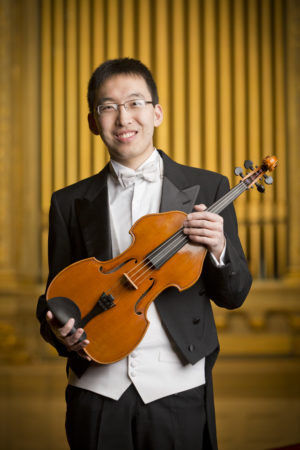 Name: Jonathan Chu
Name: Jonathan Chu
Blair major: Violin performance, with second major in economics
Year of graduation: 2003
Where you live now: St. Louis, Mo.
Profession: Violist with the St. Louis Symphony
What does a typical day look like in your career?
I play in the St. Louis Symphony. Typically, we usually have a rehearsal or two, which are around two hours, playing a variety of music, mostly classical. Every week there’s a different program, sometimes two or three. Normally, there are three or four concerts a week, so we go through a lot of music. I’m a violist in the symphony. I don’t have a lot of artistic control, but it offers a lot of financial stability.
How did your undergraduate studies at Blair shape your career?
I loved the teachers at Blair. I went to Vanderbilt for them specifically. I studied with violin professor Chris Teal, who’s now retired, but I also worked with many of the other string faculty. I went to Juilliard for graduate school and (got credit for) many of the classes, due to my preparation at Vanderbilt. That offered me a lot of flexibility with scheduling and taking classes I was more interested in, since I was so well prepared by Blair.
What is your favorite memory of Blair?
I was in a string quartet called the Clementine String Quartet, which was pretty serious. Viola professor John Kochonowski was our coach, and he was outstanding. He had studied with Bobby Mann, who was my teacher at Juilliard, so it was really neat to have that continuity.
Do you have any favorite memories or experiences from your life as a professional musician/teacher?
My first job out of Julliard was playing in the violin section in the St. Louis Symphony. I then went to the Philadelphia Orchestra as a violist, and I loved it there. From there I went to the Boston Symphony, also as a violist, which was also really amazing It was wonderful to return to the St. Louis Symphony as a violist.
What routines, ideals or practices do you think are most important in maintaining a successful music career?
One thing I learned at Vanderbilt was finding balance. Coming from a university, I was able to explore a lot of fields that were really useful. I got to go back and forth from the music world to the academic world. I learned how to be much more efficient with my time — finding the time to practice, do school work, socialize, etc.
When you go to a conservatory, the emphasis is on the performance side of things. But having the experience of a second major at Vanderbilt, having different roommates with different degrees and majors outside of music, really helped me gain perspective.
After my first year in Philadelphia, the orchestra went into bankruptcy. Because I was an economics second major, I got to be on the negotiating committee. I was able to help a lot with that situation because of my economics background. I’ve been on the members committee with each of the orchestras I’ve been in, except for Boston, and I really enjoy that work. That might be foreign for some conservatory grads, because they may not be as comfortable with the non-performance side of things. Most performers who aren’t in orchestras need to spend a lot of time doing the bookkeeping side of things, and that stuff is really, really important. So having that background and the university experience gives you a lot of flexibility (i.e. writing skills, grant writing, numbers, etc.).
What sets Blair apart from other programs?
Incredibly high-level everything. There aren’t many programs that are really good at music and really good at academics. Vanderbilt offers an important niche where you can get both, and have the support to do both. When I was there, I took lessons with my main instructor, but also all of the strings department, and that really doesn’t happen elsewhere. Blair offers more of a team approach, and it’s flexible. Everyone wants what’s best for the student.
What career advice do you have for students who are interested in pursuing a music major?
Honestly, just like anything else, you get back what you put into it. I can speak mainly to the orchestral side of things, because that’s what I’ve done. What I love about the audition process is that it’s done behind a screen. You’re competing with so many people, but all they hear is you playing.
There is a direct correlation to how much work you put in. Of course there is talent, but if you put in the time, you will reap the benefits. Go and listen to your colleagues, and talk with people around you. I learned just as much, if not more, from the people I was with as from my teachers. Everyone comes from a different place and a different knowledge base, and you can learn so much from your peers.